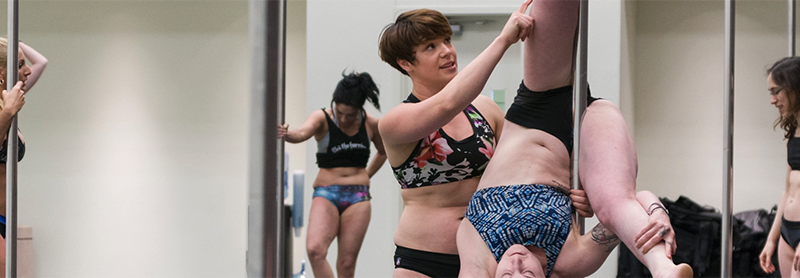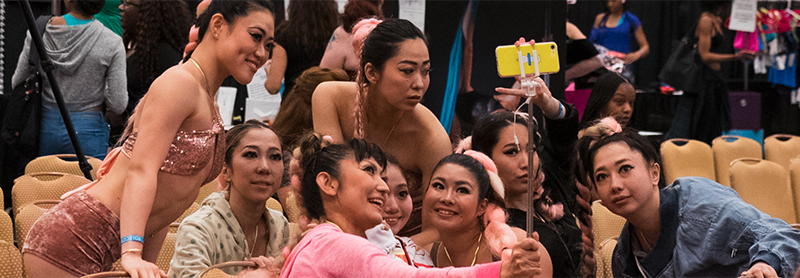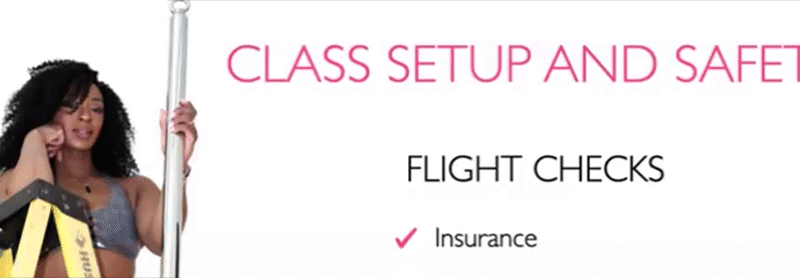Social media marketing may seem confusing and overwhelming sometimes. It is still a great way…

How to travel and teach pole dance workshops (Part 1 of 2)
Becoming a traveling or touring pole dance instructor can be super fun!
It can also be a great way to make money and meet new people.
If you are interested in hosting a touring teacher at your studio, please read this post.
If you are interested in how to start touring (or participate in an event, camp or other teaching outside of your home studio situation), keep reading.
Create your offering
First, ask yourself what you’re good at or what you’re known for as a pole dance teacher.
Sure, lots of people can teach an inversion but do you have a specialty for teaching a specific demographic or a specific type of pole? Watch this webinar on finding your niche for ideas on how to determine your specialty.
Once you have that information, create your “menu” of workshop options.
This can be a simple one-page text document, it could be a website, or something else entirely.
What it should be is clear about who you are (your biography including any certifications, awards, or titles), what you offer (your workshops), who you best serve (your target demographic, the people that get the most out of your instruction), and any other stipulations about working with you.
Have a contract
You should have a contract for basically anything.
A contract helps legally protect you and the studio or business you are working with. It also should clearly answer questions like how you’re being paid, when you’re being paid, and other requirements or stipulations like housing or transportation.
Check out this sample contract.
Even if you don’t have an official contract, consider asking for clarity on these terms (or others as relevant) in writing (email, text, DM) BEFORE you commit to traveling to teach workshops.
- Cost per head per workshop (i.e., $30)
- Required number of workshops per studio (i.e., minimum 2) (if relevant)
- Minimum number of students (i.e., minimum 5 per workshop)
- Maximum price a studio can put “on top” of the cost (i.e., $15)
- Pricing for Private classes (i.e., 1 person 60 min = $80, 2 people = $120, 3 people = $150)
- Accommodation requirements (i.e., paid hotel or a guest room in someone’s house)
- Exclusivity requirements (i.e., not teaching within a XX mile radius)
- Marketing requirements (i.e., advertising once per week on Instagram)
- Cost to cancel and timeframe to cancel (and not incur the cost) (i.e., if canceled less than 14 days in advance, 20% fees at minimum apply)
- Other stipulations like insurance requirements, ways to be paid (check, PayPal, Venmo, in the local currency etc.), and allergies (particularly important if you’re allergy to certain metals or pets and you are being hosted in a private home)
What other things would you add that are relevant to your situation? There are no wrong answers!
Traveling considerations
One way to book workshops in a new place is to add them to a trip you are already taking.
Maybe some time away from your family while on vacation or add a day or two before a work trip. In these cases, you likely wouldn’t have a studio pay for transportation related costs or host you in their home or other accommodation.
If you are traveling on a workshop teaching tour that is specifically taking you to multiple stops, getting clarify on traveling costs is essential.
Understand your budget, map out (literally) your path, and understand ALL associated costs. If you are flying between places that is likely to cost more than driving or taking the train or bus, for instance.
If you are traveling internationally, understand any local fees and laws that could impact your ability to teach and make money.
Some countries require you to have a specific business visa to make money or work in their country, while other countries require visas for visiting that may cover some business travel (such as teaching a workshop during an otherwise family vacation).
There are many, many different countries that all have different rules about working that will also change depending on your nationality and in some cases, the country you are flying from to enter their country.
Do your research before committing to an international workshop.
Other safety considerations
All pole instructors should be covered under appropriate liability insurance.
If you are a full-time employee at a studio in the US, you are likely covered under the studio’s policy. If you start teaching in other locations or for other studios, however, then you are not covered and should have your own insurance (check out the IPIA partner for insurance).
Some studios, events, or camps may also ask you to provide a certificate of insurance (COI) that explicitly lists their studio, event, camp, or business on your insurance. Usually this is something that your insurance provides at no cost and sometimes you can even do it online.
If you are teaching in another country, your current insurance might not be enough. Research to understand your options.
All pole instructors should be CPR/AED certified. While this is not a requirement to teach in many cases, some studios, events, or camps are starting to require this certification. (check out the IPIA partner for CPR).
When traveling in another country you may also need health insurance, travel insurance, or other insurance options to protect you in case something happens. Having a back-up plan for health issues, if your luggage is lost, if your passport is stolen, and numerous other things that could “go wrong” can help provide you with the better likelihood of a safe, successful trip.
Ask about the equipment you will be teaching on. While many professional pole brands like IPIA Partners X-POLE and GAIA Pole are common, there are many varieties of equipment set-ups. Understanding the equipment situation can prepare you for potential issues or even help you decide when not to teach.
In part 2, we will talk about how to get hired as a touring pole instructor and how to find opportunities.



